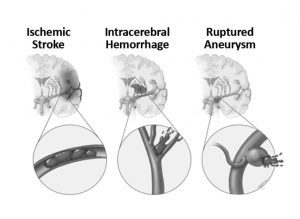By Nasser Razack, MD, JD
 May is stroke awareness month. There are many actions we can take to impact the future of stroke but none greater than its prevention. Our emphasis must switch from the treatment of the disease to its prevention by promoting better health and well-being.
May is stroke awareness month. There are many actions we can take to impact the future of stroke but none greater than its prevention. Our emphasis must switch from the treatment of the disease to its prevention by promoting better health and well-being.
Inflammation is our immune system’s response to attacks on the body by foreign substances. It is a response that enables the body to defend itself by creating a hostile environment to kill unwanted intruders. Inflammation is great when our body is under attack; however, inflammation can also be triggered to attack normal healthy tissue. In this scenario, inflammation still produces a hostile environment within the body, but damages healthy tissue instead of destroying unwanted invaders.
A stroke occurs when blood flow to the brain is interrupted, causing a deprivation of oxygen and nutrients to that section of the body. There are two types of strokes: (1) ischemic stroke caused by blocked arteries that supply oxygen to the brain and, (2) hemorrhagic stroke which results from a leaking or ruptured brain blood vessel.
Ischemic stroke accounts for the vast majority (80%) of all stroke cases and can result in the following signs and symptoms: speech difficulties, confusion, vision problems, balance issues, headaches and paralysis or numbness of the face, arm, or leg.
Increasing evidence demonstrates that inflammation plays an important role in the development of cardiovascular and cerebrovascular disease (stroke). A significant cause of inflammation is our diet. Specifically, diets high in red and processed meat, refined grains and sugar-sweetened beverages are all associated with increased inflammation which can heighten the subsequent risk of stroke compared to diets comprised of anti-inflammatory foods. Certain diets such as the Mediterranean diet—abundant in olive oil, nuts, whole grains, fruits, vegetables and seafood with reduced consumption of red and processed meat—can lower inflammation in the body (as measured by inflammatory biomarkers) and thus reduce the risk of stroke. Conversely, diets consisting of refined sugars and grains, fried foods, soda, red and processed meat which promote inflammation (as marked by increased inflammatory biomarkers), had a higher risk of stroke.
Research demonstrates that regular nut consumption is associated with lower cholesterol levels and a reduced risk for heart disease (including stroke). One study specifically examined whether a diet containing walnuts could lessen inflammation. This study examined 634 participants and determined that the regular consumption of walnuts (30 to 60 g per day or around 2 to 4 walnuts) showed reduced levels of inflammation in six of the 10 inflammatory biomarkers that were measured. Monserrat Cofan, PhD, lead author of this study, stated, “The anti-inflammatory effect of long-term consumption walnuts demonstrated in this study provides novel mechanistic insight for the benefit of walnuts consumption on heart disease risk beyond that of cholesterol-lowering.” Other studies also demonstrate that regular walnut consumption can boost brain function and slow down cognitive decline. Walnuts are rich in omega-3 fatty acids and polyphenols, both of which reduce inflammation and fight oxidative stress which are the main causes of cognitive decline .
Another study published in the Journal of Nutritional Metabolism demonstrated that a single serving of Brazil nuts containing one, four or eight Brazil nuts resulted in an almost immediate improvement in bad (LDL) cholesterol levels. Elevated cholesterol is a known risk factor for stroke and other forms of cardiovascular disease. However, researchers followed up on the participants’ cholesterol levels five days and then 30 days later. Note that during this period, the participants only had the initial single serving of one, four or eight Brazil nuts. Amazingly, they maintained lower cholesterol levels for a month after only eating that initial serving of Brazil nuts. The researchers also concluded that eating a single serving of four Brazil nuts was enough to maintain lower cholesterol levels for up to a month.
This sounds too good to be true and further research is definitely required. However, when the intervention is inexpensive, easy, harmless and healthy—such as eating four Brazil nuts a month—it’s quite reasonable to adopt this habit until proven otherwise. In case you’re wondering, the theory behind this amazing process is the selenium content of Brazil nuts. As an added benefit, the study also demonstrated these effects were achieved “without producing liver and kidney toxicity.”
Stroke is an inflammatory-based disease process. Theoretically, blocking inflammation and other degenerative processes can delay the onset of inflammatory-based diseases such as stroke. Neurcumin® is an all-natural nutrient which, in addition to curcumin, contains many other polyphenols and natural agents uniquely formulated to fight inflammation.
To learn more about Neurcumin® and the prevention of inflammatory diseases such as Alzheimer’s disease, stroke and heart attacks, please visit
Neurcumin.com. You may also call 727-289-7139 or email us at strokenerd@gmail.com for more information.
About Nasser Razack, MD, JD
Dr. Razack currently practices as a neurointerventional surgeon in Naples, Florida. He dedicates a significant portion of his practice to educating in the diagnosis, treatment and prevention of stroke. He completed his medical training at the University of Virginia in Charlottesville, Virginia.







